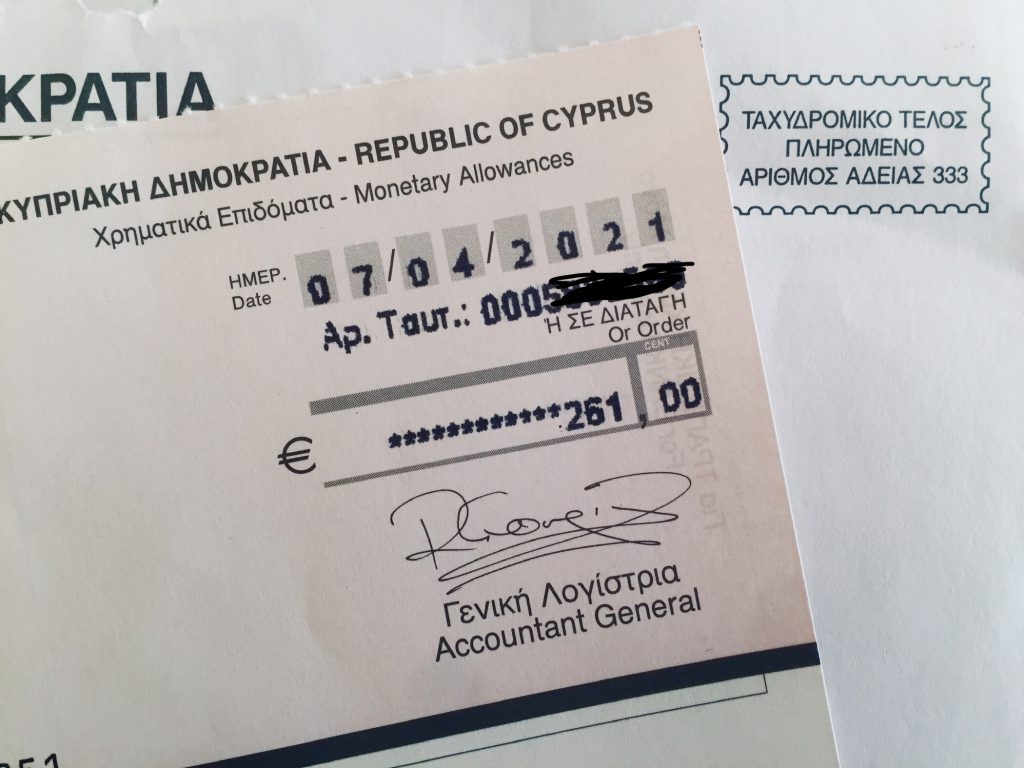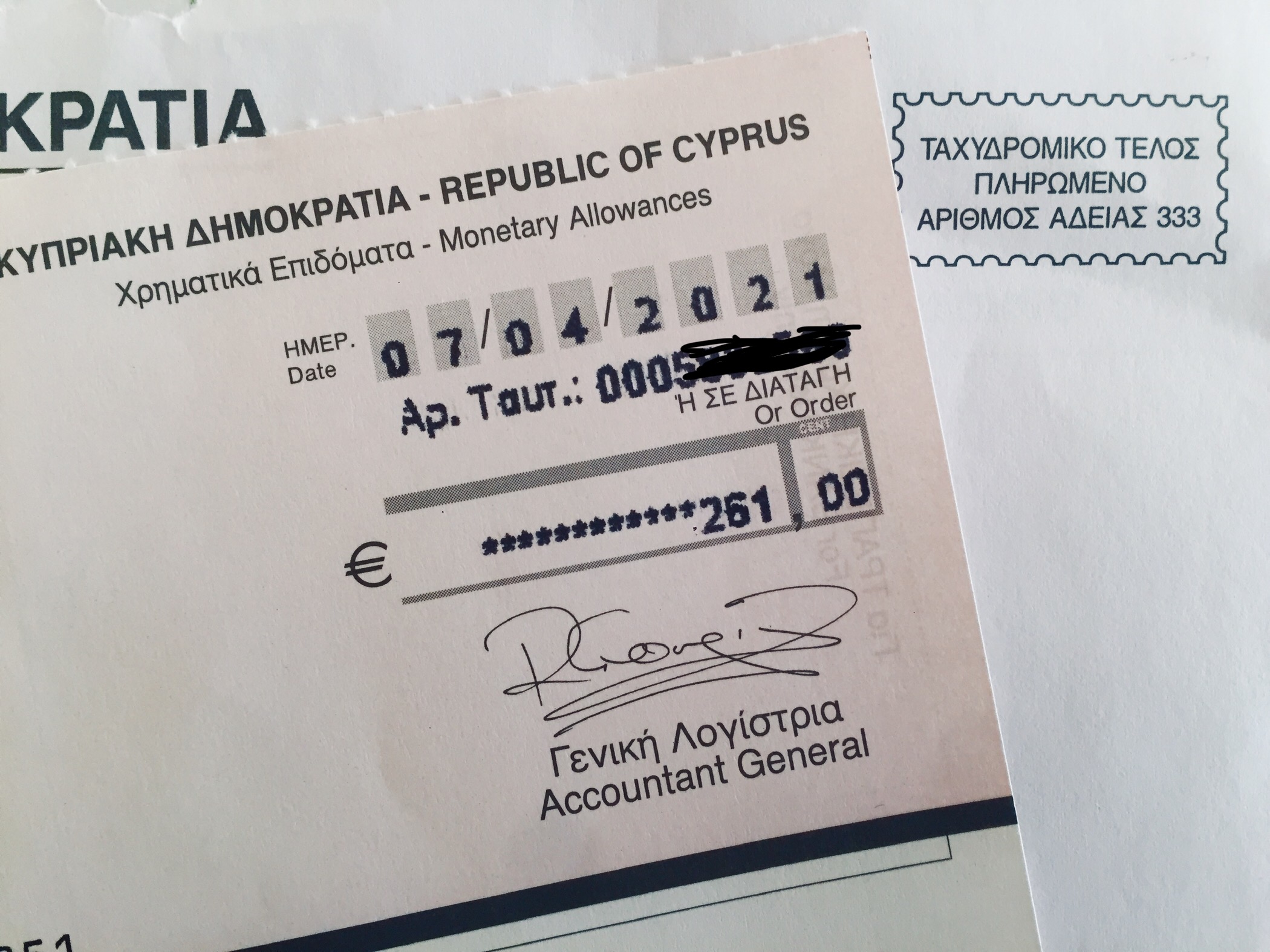
€261 is the allowance an asylum seeker receives in Cyprus. For some, it may be
sufficient, for others not. The observation is that asylum seekers still manage to manage their benefits, but in reality, they are trying to survive.
60% of the amount, around €160, is spent on food. It is up to the asylum seeker to
make do with € 5 per day. This means always cooking and avoiding indulging yourself with a restaurant dish. Likewise, he has to know where to get supplies at a lower cost. Under these conditions, certainly, many do not manage to eat balanced meals, that is to say, to have a healthy diet.
The remaining €101, which represents around 40%, is used to pay rent, electricity,
water, communication, and transport. All these charges can be managed by this small budget because the welfare pays part of the rent. Electricity and water depend on consumption. To communicate the Wi-Fi subscription is the most affordable and public transport is cheaper. But there are times when, despite good management, asylum seekers experience difficult ends of the month.
It is almost impossible to save money with your allowance. This prevents facing difficult situations such as moving, where you have to pay a deposit for the rent and another for the electricity (€350). Sometimes the allowances arrive late in the month. In certain serious cases, it happens that an asylum seeker does not receive his allowance and he has to go and claim it from welfare.
Ultimately, without the help and assistance of NGOs (like Caritas and MiHub), it is
difficult for asylum seekers to meet their needs just with allowances. To remedy these shortcomings, it is not necessarily a question of increasing allowances, but also of thinking about making them useful to society so that they no longer live on charity.


Автор старается не высказывать собственного мнения, что способствует нейтральному освещению темы.
Write more, thats all I have to say. Literally, it seems as though you relied on the video to make your point. You clearly know what youre talking about, why throw away your intelligence on just posting videos to your site when you could be giving us something enlightening to read?
Статья содержит анализ причин и последствий проблемы, что позволяет лучше понять ее важность и сложность.
Автор предоставляет анализ последствий проблемы и возможных путей ее решения.
I’ve read a few just right stuff here. Definitely price bookmarking for revisiting. I wonder how a lot attempt you set to create the sort of fantastic informative web site.
What’s up friends, its impressive post about tutoringand completely explained, keep it up all the time.
These are genuinely enormous ideas in on the topic of blogging. You have touched some nice things here. Any way keep up wrinting.
Автор старается оставаться объективным, что позволяет читателям самостоятельно оценить представленную информацию.
I loved as much as you’ll receive carried out right here. The sketch is attractive, your authored material stylish. nonetheless, you command get got an impatience over that you wish be delivering the following. unwell unquestionably come further formerly again as exactly the same nearly a lot often inside case you shield this increase.
Эта статья – источник ценной информации! Я оцениваю глубину исследования и разнообразие рассматриваемых аспектов. Она действительно расширила мои знания и помогла мне лучше понять тему. Большое спасибо автору за такую качественную работу!
When someone writes an paragraph he/she retains the image of a user in his/her mind that how a user can understand it. Thus that’s why this piece of writing is amazing. Thanks!
Автор статьи предоставляет информацию, подкрепленную исследованиями и доказательствами, без выражения личных предпочтений. Это сообщение отправлено с сайта https://ru.gototop.ee/
Hey very interesting blog!
Я нашел в статье некоторые практические советы, которые можно применить в повседневной жизни.
Я восхищен тем, как автор умело объясняет сложные концепции. Он сумел сделать информацию доступной и интересной для широкой аудитории. Это действительно заслуживает похвалы!
Я прочитал эту статью с большим удовольствием! Автор умело смешал факты и личные наблюдения, что придало ей уникальный характер. Я узнал много интересного и наслаждался каждым абзацем. Браво!
Я прочитал эту статью с большим удовольствием! Автор умело смешал факты и личные наблюдения, что придало ей уникальный характер. Я узнал много интересного и наслаждался каждым абзацем. Браво!
Я восхищен тем, как автор умело объясняет сложные концепции. Он сумел сделать информацию доступной и интересной для широкой аудитории. Это действительно заслуживает похвалы!
Автор представляет аргументы с обоснованием и объективностью.
This is very interesting, You’re a very skilled blogger. I have joined your feed and look forward to seeking more of your great post. Also, I’ve shared your web site in my social networks!
This is really fascinating, You are a very skilled blogger. I have joined your feed and look forward to searching for more of your wonderful post. Additionally, I have shared your web site in my social networks
Я оцениваю четкую структуру статьи, которая помогает организовать мысли и понять ее содержание.
Статья содержит полезную информацию, которая может быть полезной для практического применения.
Hi to all, how is everything, I think every one is getting more from this site, and your views are pleasant in support of new visitors.
This is very interesting, You’re a very skilled blogger. I have joined your feed and look forward to seeking more of your magnificent post. Also, I have shared your site in my social networks!
I am genuinely grateful to the owner of this web site who has shared this impressive paragraph at at this time.
Статья представляет различные аспекты темы и помогает получить полную картину.
I’m not that much of a internet reader to be honest but your blogs really nice, keep it up! I’ll go ahead and bookmark your website to come back in the future. Cheers
Читатели имеют возможность ознакомиться с разными точками зрения и самостоятельно оценить информацию.
Статья представляет все основные аспекты темы, без излишней детализации.
Я просто не могу не поделиться своим восхищением этой статьей! Она является источником ценных знаний, представленных с таким ясным и простым языком. Спасибо автору за его умение сделать сложные вещи доступными!
Эта статья действительно заслуживает высоких похвал! Она содержит информацию, которую я долго искал, и дает полное представление о рассматриваемой теме. Благодарю автора за его тщательную работу и отличное качество материала!
I’m not that much of a internet reader to be honest but your sites really nice, keep it up! I’ll go ahead and bookmark your website to come back in the future. All the best
I for all time emailed this webpage post page to all my associates, as if like to read it afterward my links will too.